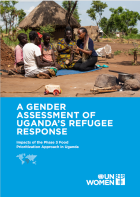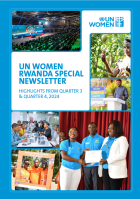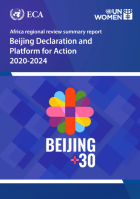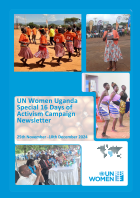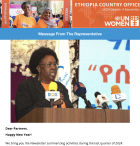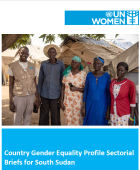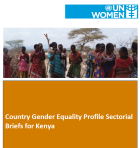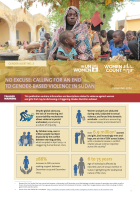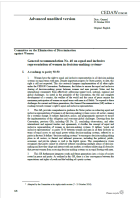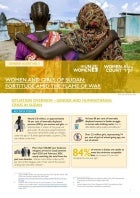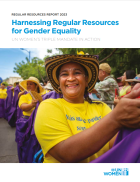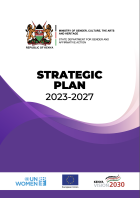Date:
Uganda’s refugee policy is progressive, yet women and children remain highly vulnerable. Since 2022, food aid cuts have severely impacted female headed households. A gender assessment across eight districts highlights these challenges, showing the disproportionate effects on livelihoods, education, and protection. Key recommendations include promoting alternative livelihoods, improving education access, strengthening GBV support, enhancing food security measures, and fostering peaceful coexistence with host communities to ensure sustainable empowerment and gender-responsive aid.
Date:
This newsletter highlights some of UN Women`s key milestones made in advancing gender equality and women`s empowerment in Rwanda in the period of July - December 2024
Date:
The message that "Women’s rights are human rights" was strongly affirmed in the 1995 Beijing Declaration and Platform for Action (BPfA). Serving as a roadmap, the BPfA outlined clear objectives to tackle 12 critical issues impacting women and girls, including education, health, economic empowerment, political participation, and human rights. As the world marks the 30th anniversary of the BPfA in 2025, it serves as a solemn reminder that, despite progress, we are still far from fully achieving its goals.
Date:
The national launch for the 16 Days of Activism Against Gender-Based violence in Uganda
Date:
Happy New Year!
We bring you the Newsletter summarizing activities during the last quarter of 2024. As we gear towards continuing our work of empowering women and girls with a renewedspirit for 2025, we reflect on how 2024 has been for GEWE work. At UN Women EthiopiaCountry Office, we concluded the year with a vibrant commemoration of 16 Days of activism.The annual Unite Campaign brought together government entities, sister UN Agencies, CSO,Women Led organizations among others. It was yet another opportunity to collaborate andrenew commitment to work for betterment of the lives of women and girls in Ethiopia.
Date:
In 2022, MGCSW and UN Women South Sudan developed the Country Gender Equality Profile, highlighting progress and challenges in gender equality, women’s rights, and governance. The study calls for increased funding, legal reforms, and socio-economic initiatives to address issues like illiteracy, violence, and limited access to services. Collaborative action by the government, UN agencies, and civic groups is essential for promoting gender equality and safeguarding women’s rights. Key recommendations include allocating funding for violence survivors, establishing the Women Enterprise Fund, reviewing the Girl Child Act, and expediting gender-related laws. The government should lift social media bans, provide platforms for women’s voices, and promote women’s inclusion in constitution drafting. Efforts should also focus on disseminating the Maputo Protocol and defining the minimum marriage age to safeguard gender equality and women’s rights.
Date:
While progress has been made in gender equality policies and peacebuilding, women face structural barriers. The study recommends strengthening legal frameworks, institutional structures, and socio-economic initiatives, urging collaboration among government, UN agencies, civil society, and partners to advance gender equality and women’s empowerment.
Date:
These policy briefs, form part of the Country Gender Equality Profile (CGEP), evaluates gender equality in Kenya, offering evidence-based insights for stakeholders to advance commitments to Gender Equality and Women’s Empowerment (GEWE). Guided by the EU Gender Action Plan 2021–2025, they promote inclusive, transformative approaches to inform programmes, policies, and actions, addressing diverse gender needs and advancing Kenya’s Sustainable Development Goals (SDGs) through national and county-level collaboration.
Date:
This study provides an overview of the kinds of administrative data on discrimination and inequality currently being produced in 22 countries across Africa. It also identifies the data and capacity gaps as well as other barriers that prevent this kind of data from being used for statistical purposes. The recommendations of the study are aimed at helping producers and users of administrative data and statistics on discrimination and inequality improve the availability and accessibility of quality data. This can be done by for example improving data governance and statistical coordination, amongst other interventions. Increased accessibility and regular publication of this data will also contribute towards greater uptake and use and ultimately more informed decision making and better monitoring of discrimination and inequality on the continent.
Date:
More than 11 million people have been displaced amid the conflict in Sudan as of October 2024, with more than half (54 per cent) being women and girls. An estimated 12 million people are currently at risk of gender-based violence, as described in this new Gender Alert by UN Women.
Date:
We are bringing the third quarter newsletter to you, filled with events in our Country office, some impact stories, and new publications. Speaking of events, at the end of this quarter, we were busy planning to host a senior leader from UN women Head Quarters, hence the delay in sharing this newsletter to add this important engagement.
We were honored to host Dr. Nyaradzayi Gumbonzvanda, Deputy Executive Director for Normative Support, UN System Coordination and Programme Results. The visit by DED Nyaradzayi Gumbonzvanda marked a pivotal opportunity to reinforce and strategically align the partnership between UN Women and Ethiopian government and CSOs as well as between UN Women, the African Union Commission (AUC), and UNECA and UN sister agencies.
Date:
Women have the right to equal and inclusive representation in all decision-making systems on equal terms with men. Despite important progress by States parties, to date, this right is still not respected. This General Recommendation (GR) outlines a roadmap towards women’s right to equal and inclusive representation. It provides comprehensive guidance for States parties on achieving equal and inclusive representation of women in all decision-making systems across all sectors, aiming for a systemic change.
Date:
The UN Women Kenya Annual Report highlights key achievements in advancing women’s empowerment and gender equality.
This report showcases progress in increasing women’s leadership and political participation, strengthening economic empowerment, eliminating violence against women and girls, engaging women in peace and security efforts, and enhancing planning and coordination.
UN Women Kenya remains dedicated to building a future where women are at the heart of developing resilient and sustainable communities.
Date:
This analysis of laws from a gender perspective was undertaken to provide an in-depth understanding of the current legal framework in both Tanzania Mainland and Zanzibar, and to identify gaps and discriminatory provisions with the long-term vision of advocating for legal reform. The analysis explores the vast spectrum of laws to assess their gender responsiveness, and highlights discriminatory provisions and gaps that require repeal, amendment or enactment.
Date:
Workshops and events organized by the UN and its partners at the SVRI Forum will provide invaluable spaces for knowledge exchange, from addressing the intersection of violence against women and children, to exploring digital solutions, and enhancing research methods.
Date:
This publication provides a detailed analysis of the ongoing humanitarian crisis in Sudan, focusing on its disproportionate impact on women and girls. As the country faces the largest internal displacement since the Syrian civil war, millions of Sudanese, particularly women and children, are grappling with severe challenges.
Date:
The report demonstrates how regular resources are invested to advance integrated triple mandate results. This includes explicit recognition of the expertise and leadership of UN Women staff, which relies on regular resources investments. Country, regional, and global examples illustrate how regular resources, often together with other resources, build momentum in synergy to deliver important advancements for women and girls.
Date:
The Publication is a detailed strategic plan for the period 2023-2-27. It highlights previous achievements, lessons and emerging issues that define the policy direction of the gender sector achieving a society free from gender discrimination and violence
Date:
This brief relies on data and findings from the Social Institutions and Gender Index (SIGI) report for Tanzania conducted in 2022, complemented by online literature. To empower women in other important areas, gender equality in the home and private spheres is essential. Nonetheless, discriminatory social norms and traditional roles are frequently the strongest and hardest to overcome within the home and family.
Date:
These are key messages developed from the Social Institutions and Gender Index (SIGI) report for Tanzania conducted in 2022.

